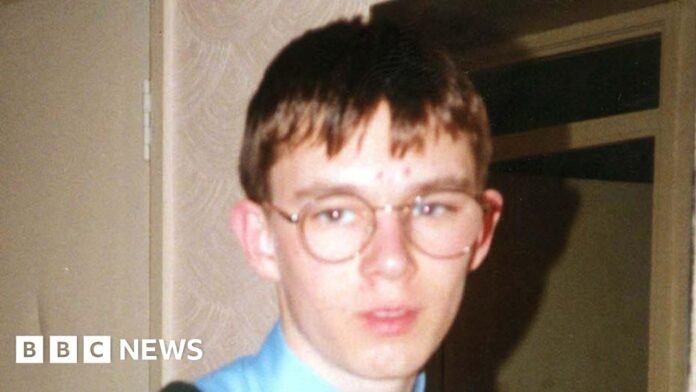BBC News NI
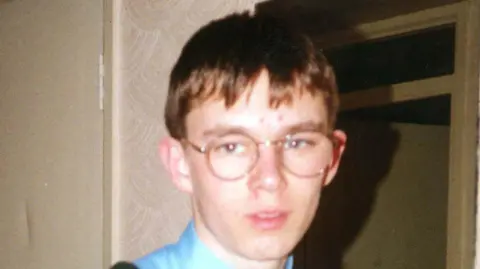 Pacemaker
PacemakerThe sister of a man killed in the Omagh bombing, who has launched a legal bid to force the Republic of Ireland to set up its own public inquiry, has branded its government “cold” and “defensive”.
Shawneen Conway’s brother Gareth, 18, was among 29 people, including a woman pregnant with twins, who died in the Real IRA attack in 1998.
The atrocity came less than three months after the people of Northern Ireland had voted yes to the Good Friday Agreement.
Ireland’s Department of Justice said it would be inappropriate to comment on any ongoing legal proceedings, but said a memorandum of understanding signed in April was an “important step” in its support of the UK’s Omagh Bombing Inquiry.
It added that the inquiry’s chair, Lord Turnbull, had expressed reservations about two “parallel inquiries running concurrently”.
Ms Conway said her “kind” and “hardworking” brother Gareth had just gained a place to study engineering at university and had been “hopeful for a bright future” when he was killed.
In her first ever interview, Ms Conway told BBC News NI that she feared the UK public inquiry, which began in January, would be a “waste of time” if only “half a truth is examined”.
“There are two sides involved,” she said.
“It involved intelligence and security failures on both sides of the border, and if there’s going to be real accountability and understanding, both governments need to be fully transparent.
“The UK inquiry is a step in the right direction, but without a parallel inquiry in the Republic, it’s going to go nowhere – it’ll be a waste of time.”
‘My parents died not knowing the truth’
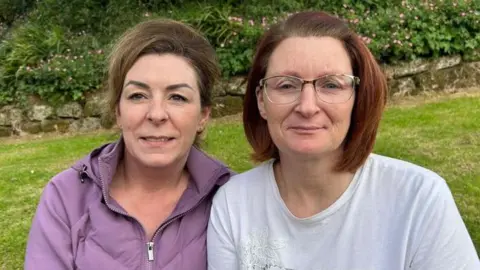
Ms Conway and her sister Michaela Taggart told BBC News NI that the loss of their brother Gareth had “shattered” their family.
They said they lost another brother seven years after the bomb, and that both their parents died four years ago – desperate for truth and justice.
Ms Taggart said: “I used to go to the house after Gareth passed and we would keep his memory alive by talking with mum and dad.
“But now that mum and dad have both gone – when they died, it was like losing him all over again.”
“It completely devastated them,” Ms Conway added.
“And both of them died not knowing the truth, which is horrible.
“My mummy did say to me she wouldn’t find it out, but she hoped that I would, that we would. And that’s what she wanted. She wanted to know why, and she wanted justice.”
What has the Irish government agreed to?
The public inquiry was established to examine if the attack could have been prevented by UK authorities.
Earlier this year, the Irish government agreed a cooperation agreement with the UK inquiry, allowing it access to material held by the Irish state.
But some victims’ families argued that an inquiry in that jurisdiction would be the only way to ensure full disclosure of information and compel witnesses based in Ireland to provide evidence.
Ms Conway is one of two applicants who launched legal proceedings in the High Court in Dublin at the end of July. The other applicant, Emmet Tunney, is a severely-injured survivor of the bomb.
They are seeking to bring a case to compel the Irish government to establish its own inquiry. It’s understood the Irish state is to oppose the applications, and has until 4 November to respond in full to the proceedings.
Ms Conway said there had been very little communication with the Irish government and that when it did recently reach out to talk to families of those killed or injured in the bombing, she didn’t think it went well.
“They were very cold, very defensive, there was no empathy, there was no care,” she said.
“And I got the sense that they didn’t want to know – they don’t want to know. They just want it to go away and they think it will if they ignore it.”
In a statement, Ireland’s Department of Justice said it would not be appropriate to comment on “ongoing legal proceedings”.
However, it did say that a memorandum of understanding signed in April with Lord Turnbull, the Omagh Bombing Inquiry chair, was a “truly important step” in delivering on the government’s commitment to “facilitating and supporting the Omagh Inquiry”.
It also said Lord Turnbull had expressed reservations on the issue of two parallel inquiries running concurrently, particularly around the “possibility of divergence between two inquiries assessing the same evidence and witnesses, and the question of which findings would take priority”.
It added: “On the margins of the Core Participant hearings in June, Irish government officials used the opportunity to convene a meeting to listen to families and survivors of the bombings.”
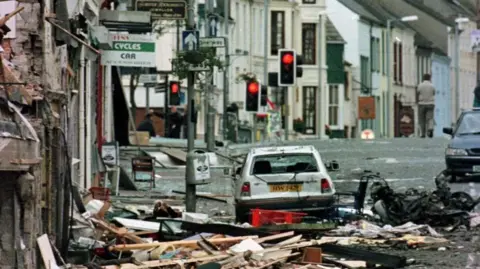 PA Media
PA MediaOmagh bombing anniversary
Next week – 15 August – marks the 27th anniversary of the bomb, which remains the single biggest atrocity of the Troubles.
Ms Taggart said having to identity her brother’s body was one of the hardest things she’s ever had to do.
She said every anniversary brings her back to that devastating day.
“I get catapulted back – emotionally, everything. I’m back in the room. I’m back in the wake with his body – because it’s the last place he was for me.”
Both sisters said getting to the truth behind the bomb was what they needed to achieve some level of closure.
‘Unvarnished truth’
Conor Cullen, the solicitor representing the Conway family in the legal challenge, told BBC News NI that a parallel inquiry in the Republic of Ireland was necessary in uncovering “the unvarnished truth”.
“We don’t want to get to a situation where we come to the end of the UK public inquiry and there are still some questions arising, which we say the Irish state could possibly answer,” he said.
He said it was “vitally important” to get “all the facts surrounding the intelligence and the actions or inactions of the Irish authorities”.
Mr Cullen said it was important an Irish inquiry was in place ahead of the next stage of the UK inquiry, scheduled for March 2026, during which evidence will be heard in relation to who was behind the bombing and how it was carried out.
He added: “We say you can’t properly understand the Omagh bomb if you only look north of the border.”
As such, he said, a parallel inquiry would “mean everything to the families”.
“They currently have a seat at the table at the UK public inquiry. We say they also should have a seat at the table in a public inquiry set up by the Irish state,” he said.
“And I think for the families, it would really show to them that their lives and their loss is valued no matter what side of the border they live on.”
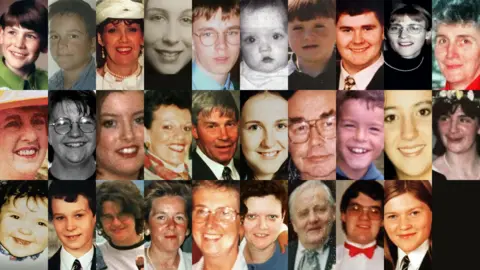
Who carried out the Omagh bombing?
Three days after the attack, the Real IRA released a statement claiming responsibility for the explosion.
It apologised to “civilian” victims and said its targets had been commercial.
Almost 27 years on, no-one has been convicted of carrying out the murders by a criminal court.
In 2009, a judge ruled that four men – Michael McKevitt, Liam Campbell, Colm Murphy and Seamus Daly – were all liable for the Omagh bomb.
The four men were ordered to pay a total of £1.6m in damages to the relatives, but appeals against the ruling delayed the compensation process.
A fifth man, Seamus McKenna, was acquitted in the civil action and later died in a roofing accident in 2013.



